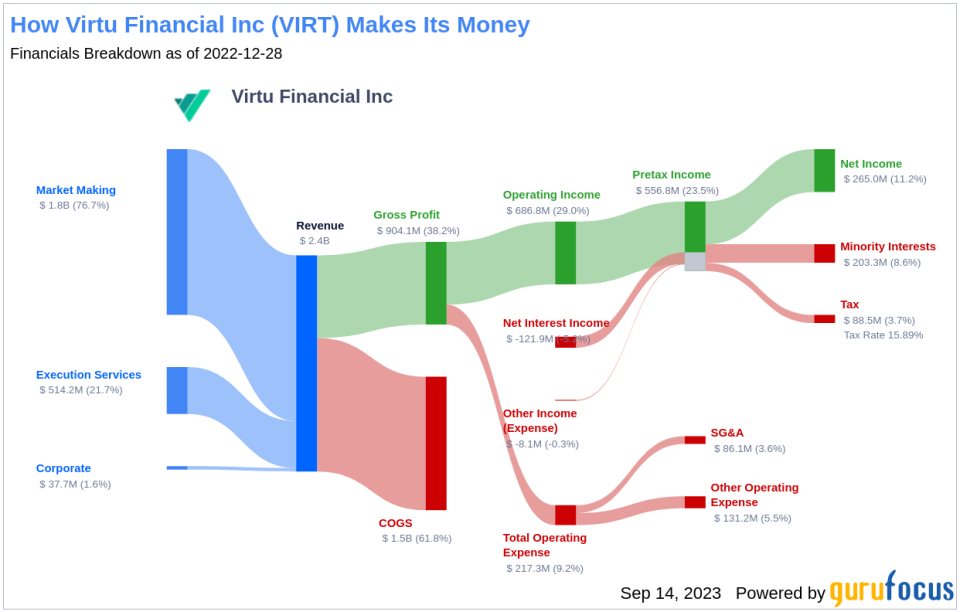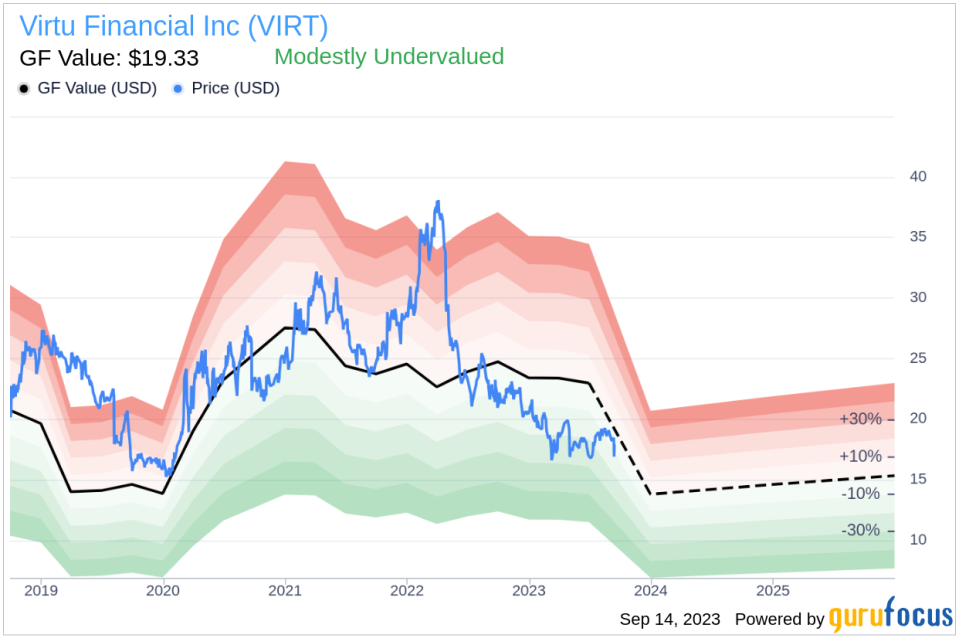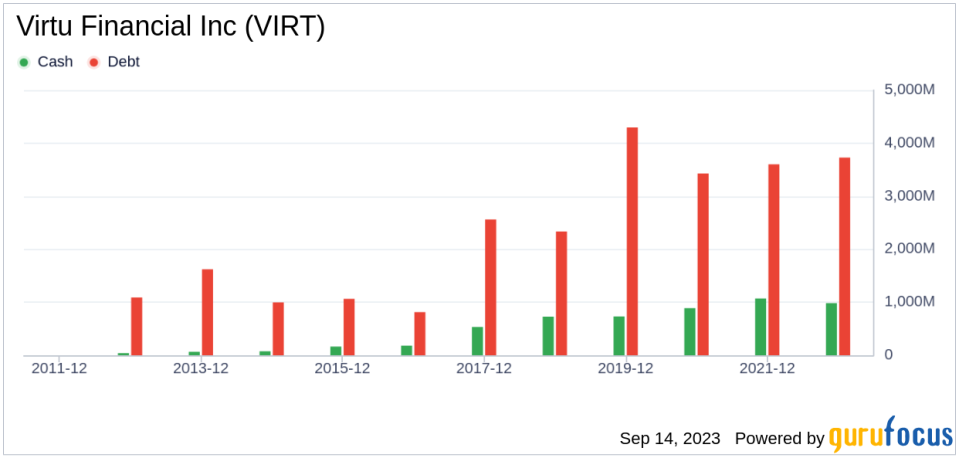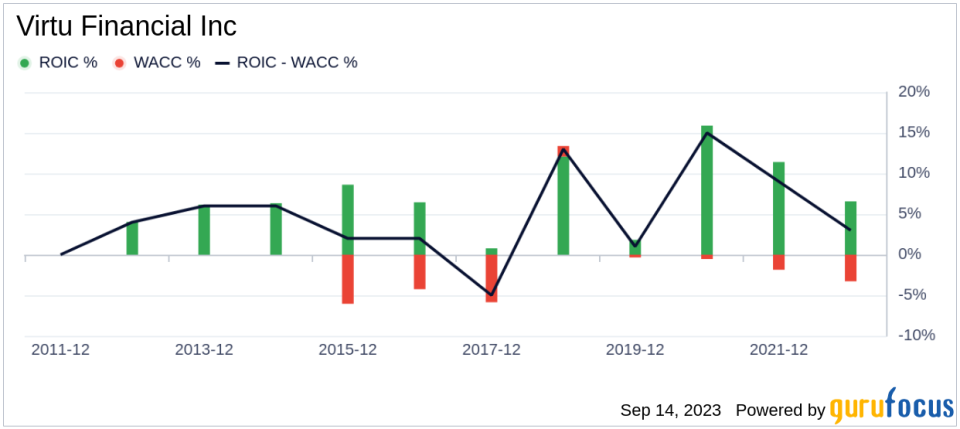Unveiling Virtu Financial (VIRT)'s Value: Is It Really Priced Right? A Comprehensive Guide
Virtu Financial Inc (NASDAQ:VIRT) saw a daily gain of 6.1%, despite a 3-month loss of -0.87%. With an Earnings Per Share (EPS) (EPS) of 1.36, the question arises: is the stock modestly undervalued? This article aims to answer this question by providing an in-depth valuation analysis of Virtu Financial (NASDAQ:VIRT). Read on to explore the company's financial strength, profitability, and growth prospects.
Company Introduction
Virtu Financial Inc is a technology-enabled market maker and liquidity provider to the global financial markets. The company's operating segments include Market Making, Execution Services, and Corporate, with Market Making generating the majority of its revenue. Geographically, it derives most of its revenue from the United States but also has a presence in Ireland, Singapore, Canada, Australia, and other countries.
With a current stock price of $17.92 per share and a market cap of $1.70 billion, the company's GF Value, an estimation of fair value, stands at $19.33. This suggests that Virtu Financial's stock is modestly undervalued.
Understanding GF Value
The GF Value represents the current intrinsic value of a stock derived from our exclusive method. It is calculated based on historical multiples (PE Ratio, PS Ratio, PB Ratio, and Price-to-Free-Cash-Flow) that the stock has traded at, GuruFocus adjustment factor based on the company's past returns and growth, and future estimates of the business performance.
Virtu Financial (NASDAQ:VIRT) stock is believed to be modestly undervalued based on the GuruFocus Value calculation. At its current price of $17.92 per share, Virtu Financial has a market cap of $1.70 billion, and the stock is believed to be modestly undervalued. As the company is relatively undervalued, the long-term return of its stock is likely to be higher than its business growth.
Link: These companies may deliver higher future returns at reduced risk.
Financial Strength
Investing in companies with poor financial strength has a higher risk of permanent loss of capital. Thus, it is important to carefully review the financial strength of a company before deciding whether to buy its stock. Looking at the cash-to-debt ratio and interest coverage is a great starting point for understanding the financial strength of a company. Virtu Financial has a cash-to-debt ratio of 0.12, which is worse than 90.98% of 754 companies in the Capital Markets industry. GuruFocus ranks the overall financial strength of Virtu Financial at 4 out of 10, which indicates that the financial strength of Virtu Financial is poor.
Profitability and Growth
Investing in profitable companies carries less risk, especially in companies that have demonstrated consistent profitability over the long term. Typically, a company with high profit margins offers better performance potential than a company with low profit margins. Virtu Financial has been profitable 9 years over the past 10 years. During the past 12 months, the company had revenues of $2.20 billion and Earnings Per Share (EPS) of $1.36. Its operating margin of 19.29% is better than 60.71% of 644 companies in the Capital Markets industry. Overall, GuruFocus ranks Virtu Financial's profitability as strong.
Growth is probably the most important factor in the valuation of a company. GuruFocus research has found that growth is closely correlated with the long term performance of a company's stock. The faster a company is growing, the more likely it is to be creating value for shareholders, especially if the growth is profitable. The 3-year average annual revenue growth rate of Virtu Financial is 19.4%, which ranks better than 71.66% of 681 companies in the Capital Markets industry. The 3-year average EBITDA growth rate is 81.6%, which ranks better than 90.64% of 470 companies in the Capital Markets industry.
ROIC vs WACC
Another way to evaluate a company's profitability is to compare its return on invested capital (ROIC) to its weighted cost of capital (WACC). Return on invested capital (ROIC) measures how well a company generates cash flow relative to the capital it has invested in its business. The weighted average cost of capital (WACC) is the rate that a company is expected to pay on average to all its security holders to finance its assets. If the ROIC is higher than the WACC, it indicates that the company is creating value for shareholders. Over the past 12 months, Virtu Financial's ROIC was 3.39, while its WACC came in at 3.92.
Conclusion
Overall, Virtu Financial (NASDAQ:VIRT) stock is believed to be modestly undervalued. The company's financial condition is poor and its profitability is strong. Its growth ranks better than 90.64% of 470 companies in the Capital Markets industry. To learn more about Virtu Financial stock, you can check out its 30-Year Financials here.
To find out the high quality companies that may deliver above average returns, please check out GuruFocus High Quality Low Capex Screener.
This article first appeared on GuruFocus.




